Lemon Mascarpone Mousse (Lemon Whipped Cream)
Don't let the idea of combining dairy and lemon juice scare you! This lemon whipped cream dessert (or as I call it, lemon mascarpone mousse) is thick and fluffy, slightly sweet and tart. Speaking of tarts, it's lovely in a fruit tart – you can also top cupcakes with it, frost a cake, layer it in a parfait, or just eat it by the spoonful.
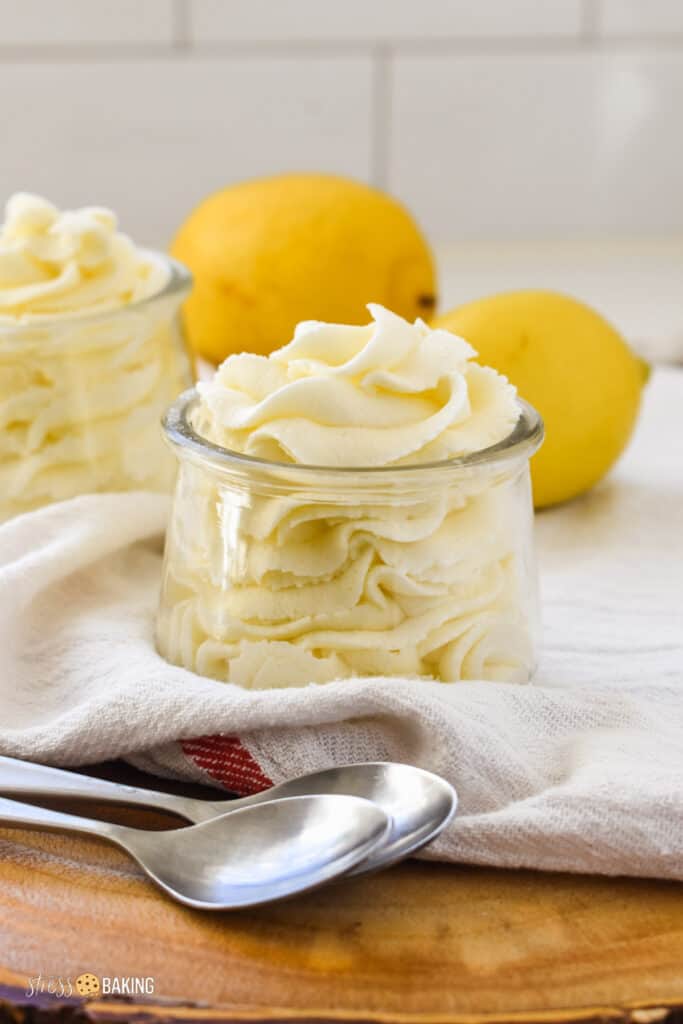
Anne said: “I made this super quick dessert and it’s so yummy! I loved that it only had a few ingredients and ones I had around. It wasn’t too hard to fold / lightly mix it together to make sure it all combined and turned out so well. I added extra lemon cause I love it, and still mixed together perfectly. Quick. Easy. Fresh tasting! Definitely something I’ll make again to make myself think it’s summer! ⭐⭐⭐⭐⭐“
I have been making and loving this lemon mascarpone mousse for years – you could also call it lemon whipped cream, which is a perfectly accurate name. I've used it in and on practically anything and everything that I think would benefit from a little zesty lemon flavor:
- As the filling of a fruit tart
- To layer with strawberries in fruit parfait
- As a filling layer and frosting for homemade lemon cake
- As frosting on cupcakes – I know it's a bit out of the box, but I actually love it on top of my chocolate beet cake
- Slathered on a piece of lemon poppy seed loaf
- As an accompaniment to some delicious scones
- As a topping for pie (strawberry rhubarb, in particular)
- Swapped for the whipped cream in some strawberry shortcakes
- Directly into my mouth… you know, the usual.
But here's the thing – people are afraid to combine citrus juice with mascarpone cheese and heavy cream because they believe it will just curdle and be ruined, or you'll end up with buttermilk.
Not true, my friends! Let's talk a little about the difference between curdling, buttermilk, and why the way we're preparing it for this dessert prevents it from taking either of those forms.
What is curdled milk?
Simply put, curdled milk is what most people see as a sign of spoiled milk – formerly smooth milk that now has lumps and chunks in it. I don't want to ruin your appetite with pictures of curdled milk, so check out these Google Image search results to get visual examples.
Milk is slightly acidic as is, so when the pH of milk is lowered even more by adding an acidic ingredient like lemon juice, the protein molecules will stop repelling each other and stick together to form curds. You'll also get a cloudy liquid that separates from the curds (which is called whey). Appetizing, right?
But here's the thing – the curdling of milk isn't always a bad thing. While it could be a sign of milk gone bad, it's also done intentionally as part of the process of making delicious things like ricotta cheese!
Hot milk vs. cold milk
Another important distinction here for the sake of the baking process that combines these ingredients is that If you were to add lemon juice to hot milk, it would curdle almost immediately. It can happen with cold milk (as you've likely seen with a carton of milk that hung out in the fridge for a little bit too long past it's expiration date), but it takes much, much longer.
But that's not what we're doing here – we're using cold heavy cream and mascarpone cheese and combining the ingredients in a certain sequence to prevent curdling.
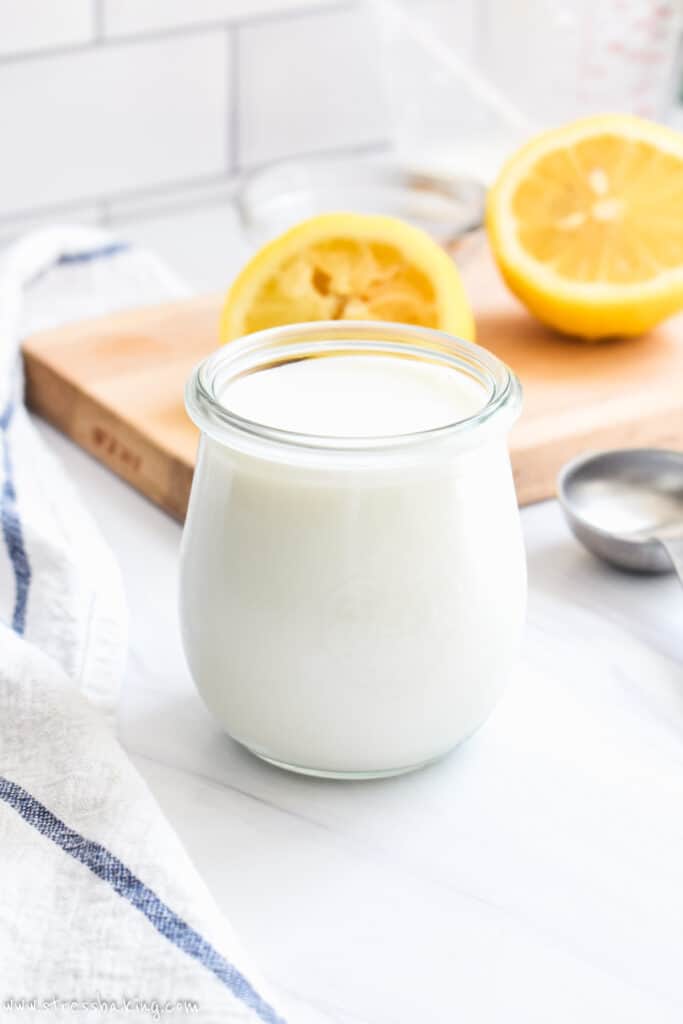
What is buttermilk?
Lucky for you, I have an entire post dedicated to the subject of making your own buttermilk! I go into much more detail in the most about what buttermilk is, how to use it, and how to make it – but we'll cut to the chase for the sake of this post – one of the methods is to add lemon juice to cold milk.
Buttermilk is a slightly sour, tangy milk that is thicker than regular dairy milk – but it's not lumpy! That's because you're adding the acid to cold milk, and not hot milk.
Per Wikipedia:
The tartness of cultured buttermilk is primarily due to lactic acid produced by lactic acid bacteria while fermenting lactose, the primary sugar in milk.
As the bacteria produce lactic acid, the pH of the milk decreases and casein, the primary milk protein, precipitates, causing the curdling or clabbering of milk. This process makes buttermilk thicker than plain milk.
But here's the thing – you're not going to make buttermilk then just sit down and drink it. You're purposely causing that chemical reaction so that you can add it to recipes that call for the combination of buttermilk and perhaps baking soda to provide a tender, light results to baked goods. Check out the full post about buttermilk for the more in depth explanation.
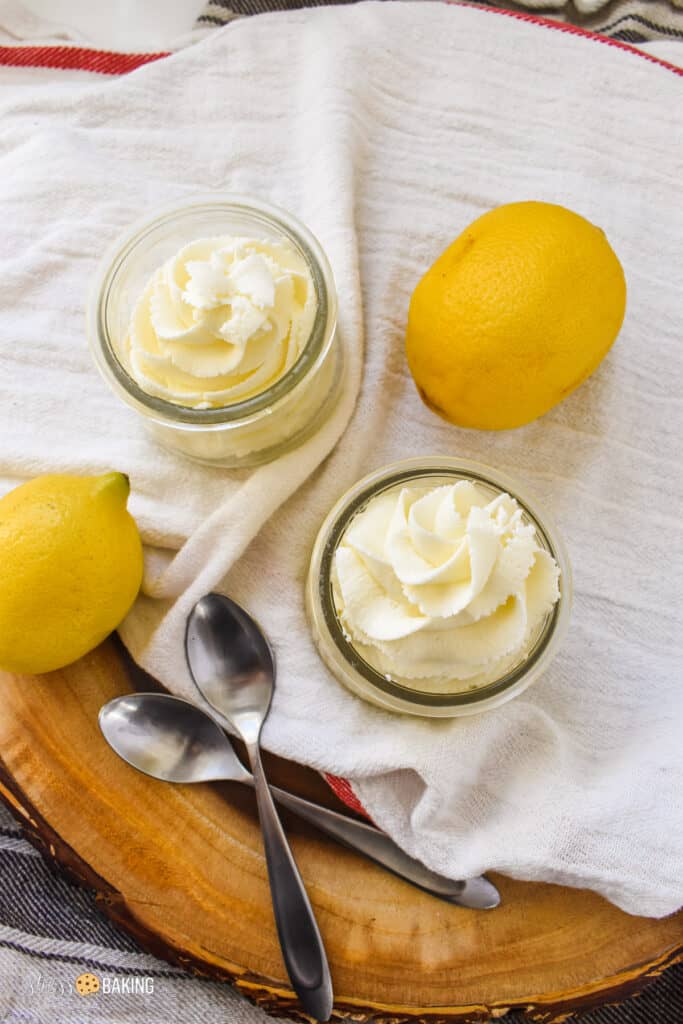
Will lemon juice curdle whipped cream?
In theory, yes it could – but like I mentioned in an earlier section, we're avoiding that curdling reaction by using cold ingredients and whipping them in stages before adding the lemon juice.
We're very purposely adding the ingredients in a certain sequence to create a “firm” consistency that prevents it from curdling (now or later) when you add the lemon juice.
Let's talk through the process, shall we?
Key Ingredients
- Cold mascarpone cheese
- Granulated sugar
- Cold heavy cream
- Pure vanilla extract
- Salt
- Cold, freshly squeezed lemon juice
How to make lemon mascarpone mousse
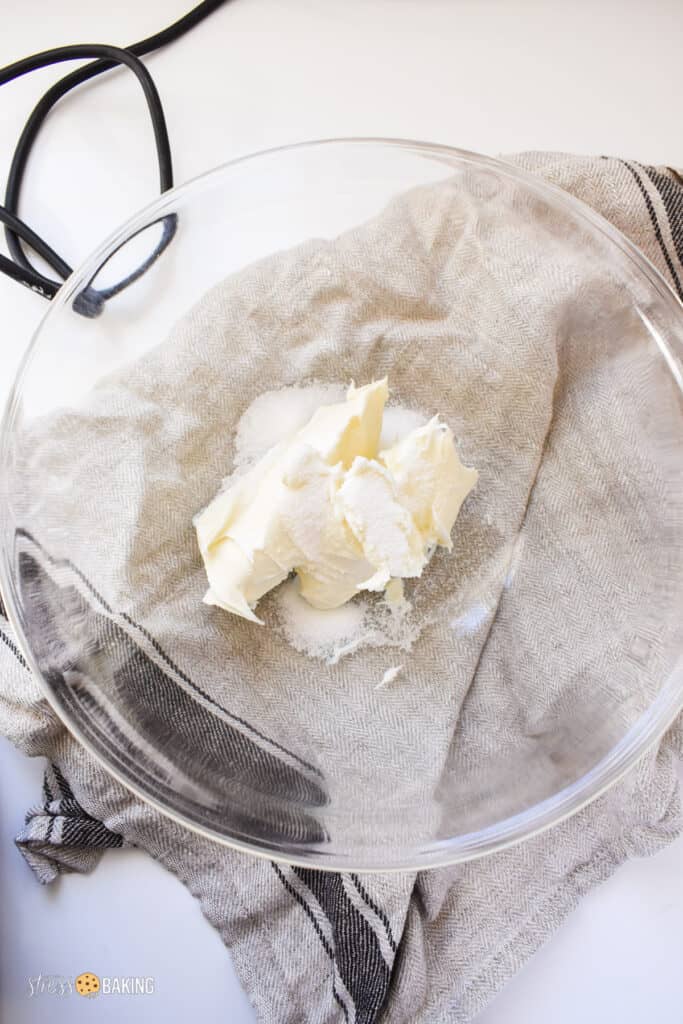
Step 1: In a medium bowl, you'll combine the mascarpone cheese and 1 tablespoon sugar.
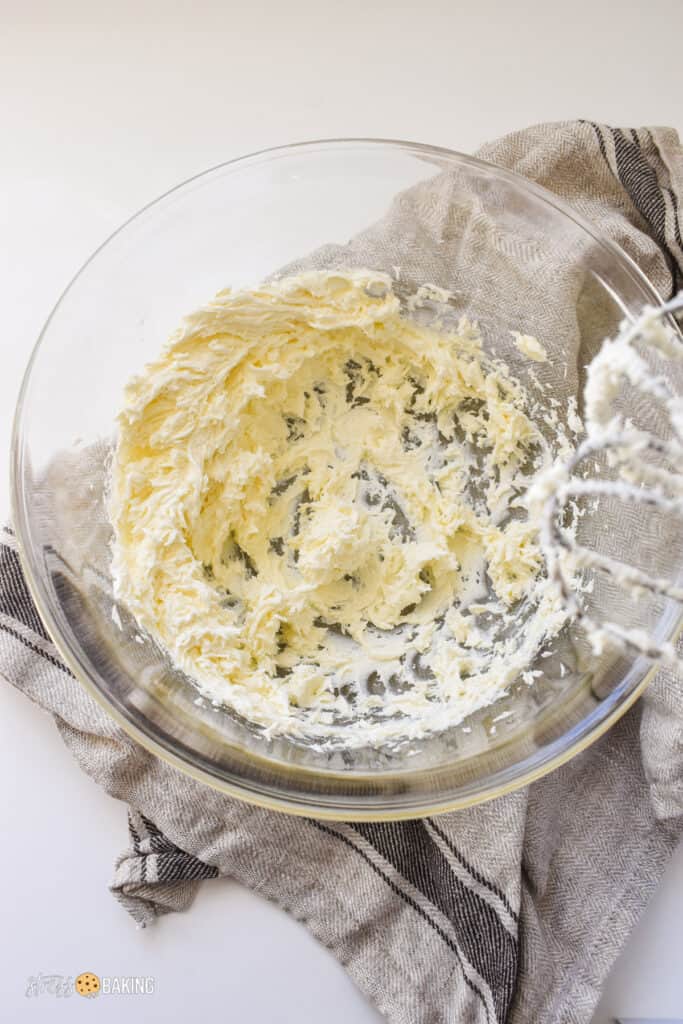
Step 2: Use a hand mixer or stand mixer (aff link) to beat on high speed until combined.
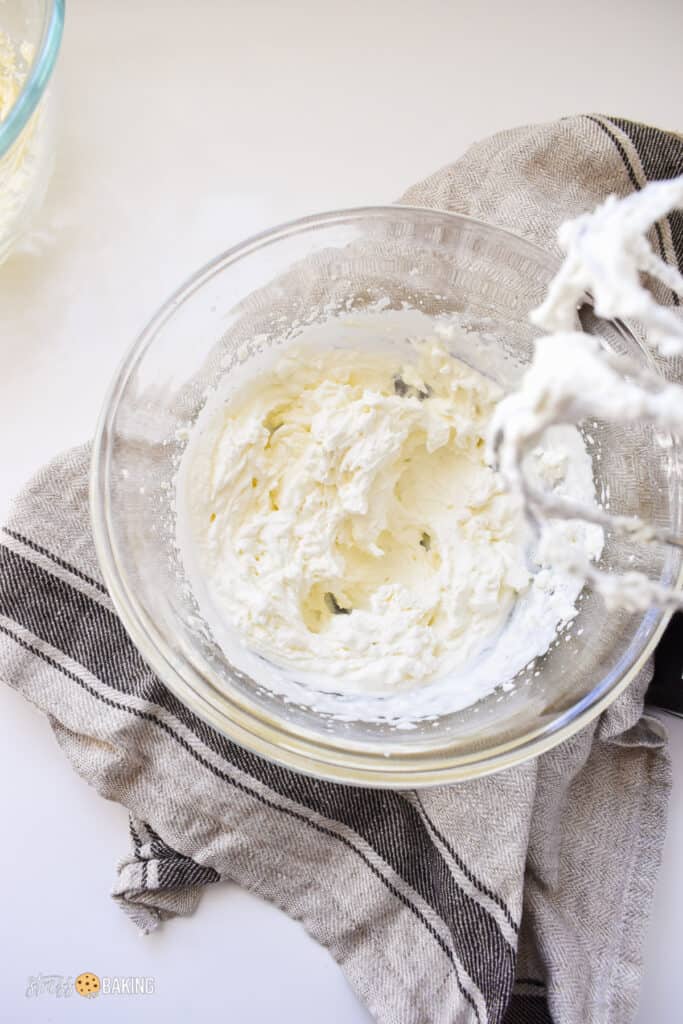
Step 3: In a separate medium bowl, you'll combine the heavy cream, remaining ½ tablespoon sugar, vanilla and salt.
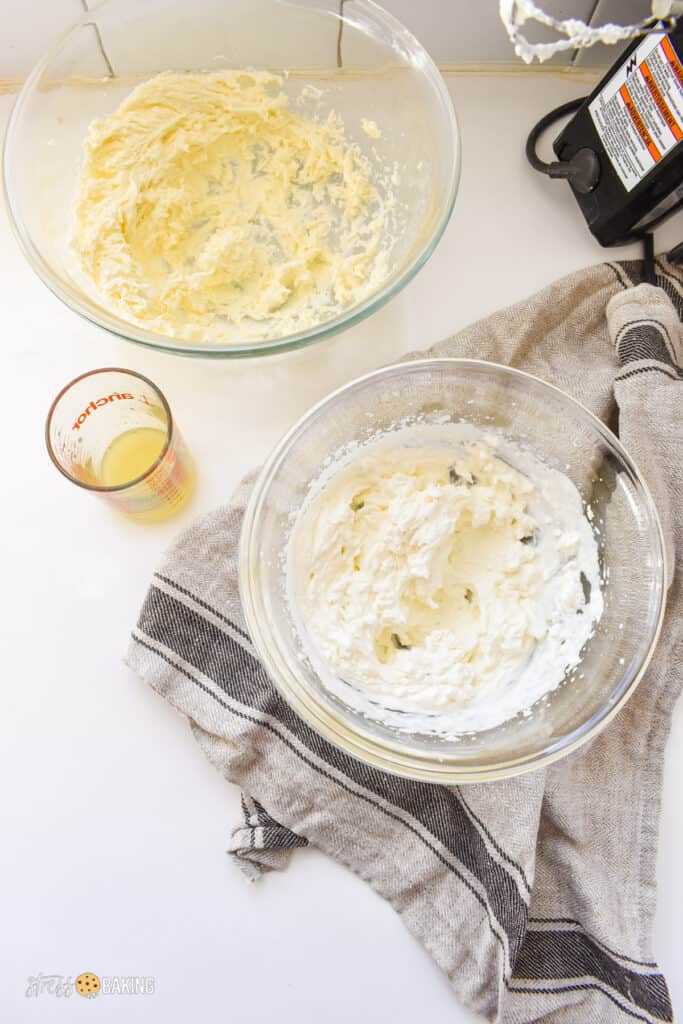
Step 4: Use a hand mixer to beat on high speed until it forms soft peaks.
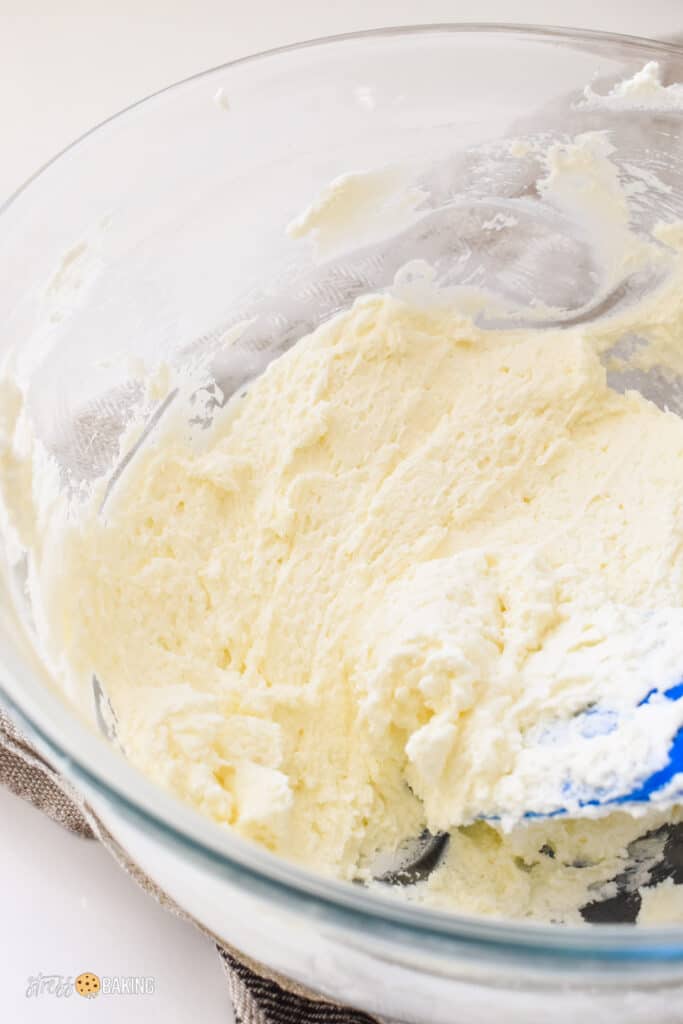
Step 5: Use a spatula to fold the heavy cream mixture into the mascarpone mixture.
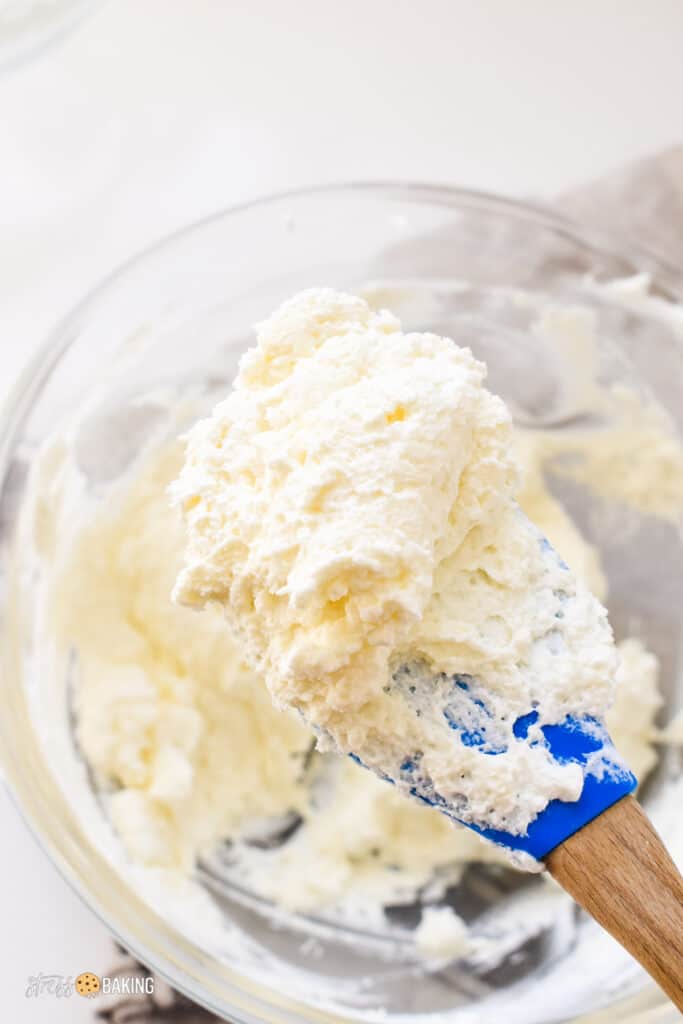
NStep 6: Use the spatula to fold in the lemon juice.
And that's it, you're done!
If I'm being completely honest with you, I usually just add the heavy cream mixture and lemon juice to the bowl of mascarpone mixture at the same time, and I've never had an issue.
But because people are generally so hesitant about adding the lemon at all, I just indicate that as the last step for people's comfort level :)
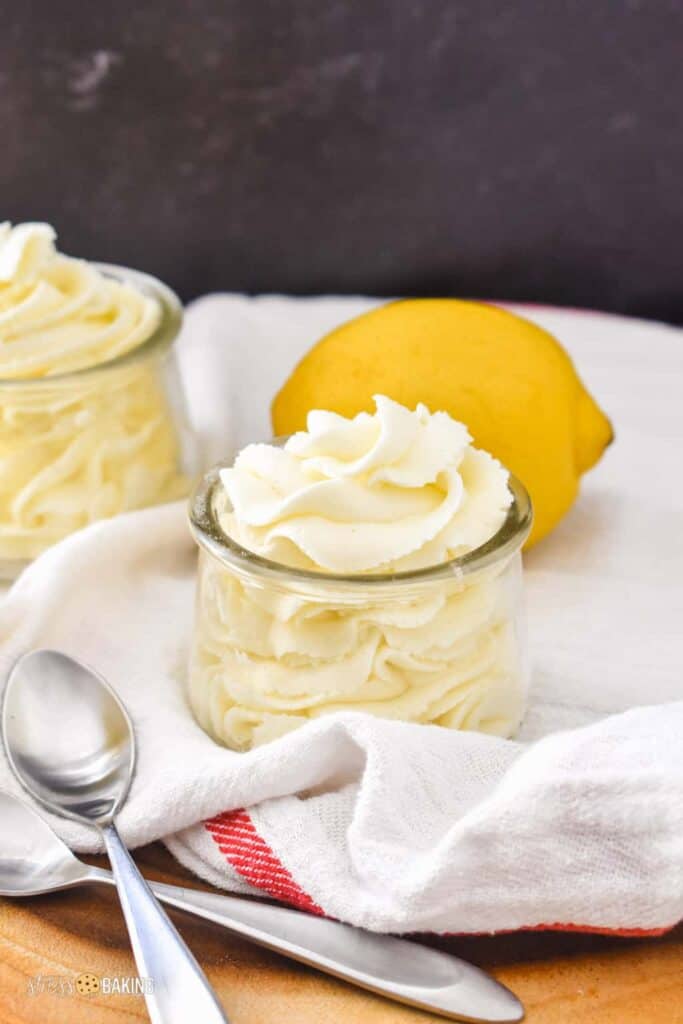
What's the right texture?
Your lemon mousse will not be completely silky smooth, but it should still be creamy, light and fluffy.
Some people think the mascarpone “curdles” when they folded in the lemon juice, but that should not be the case (unless you went a little crazy with your whisk or spatula).
Take a peek at the photos in this post as well as my original mascarpone whipped cream recipe and you'll notice that in picture they have seem to have a similar consistency. This is going to be a bit thicker.
Can I use bottled lemon juice?
Sure – I always recommend fresh over bottled, but if you choose to use a bottled lemon juice instead of freshly squeezed, just note that your results may vary. For example, it might be creamier and less fluffy than what you see pictured.
Variants in lemon acidity
The acidity of lemons can vary based on what's available where you live, the season, etc. There's nothing wrong with that, it's just something to keep in mind! So your result might be less or more fluffy than what you see in my photos just because of that variances.
Check out the video!
It can sometimes be hard to convince people only through pictures that a food will look good, taste good, and work out the way they want it to because there's only so much you can do without a hands on experience. But I try my best, and only hope that you'll give it a try.
Check out the video in the recipe card at the bottom of the post I've made of the process as well – I hope this helps you feel more confident about making this delicious lemon whipped cream/mousse/indulgence yourself!
Leaving a comment and star rating is a great (and free) way to support Stress Baking. After you've enjoyed this recipe, click on the stars below and leave a comment to share your experience – thank you!
Lemon Mascarpone Mousse (Lemon Whipped Cream)
Equipment
Ingredients
- 6 ounces mascarpone cheese, cold
- 1 ½ tablespoons granulated sugar, divided
- ½ cup heavy cream, cold
- ½ teaspoon pure vanilla extract, can substitute clear vanilla extract
- Pinch salt
- 1 tablespoon lemon juice, freshly squeezed and cold
Instructions
- In a medium bowl, combine mascarpone cheese and 1 tablespoon sugar, and use a hand mixer or stand mixer (aff link) to beat on high speed until combined.6 ounces (170 g) mascarpone cheese1 1/2 tablespoons (1 ½ tablespoons) granulated sugar
- In another medium bowl, combine heavy cream, remaining 1/2 tablespoon sugar, vanilla and salt and use a hand mixer to beat on high speed until it forms soft peaks.1 1/2 tablespoons (1 ½ tablespoons) granulated sugar1/2 cup (119 g) heavy cream1/2 teaspoon (½ teaspoon) pure vanilla extractPinch salt
- Use a spatula to fold the heavy cream mixture into the mascarpone mixture (if needed, give it a quick beat with the mixer), then fold in the lemon juice until completely combined.1 tablespoon lemon juice
- Spoon mousse mixture into a pastry bag to pipe into serving dishes, spread on a cake, or just dig in with a spoon :) Enjoy!
Video
Notes
Nutrition Facts
Nutrition Disclaimer
The provided nutrition information is generated by an automatic API and does not take variations across specific brands into account. This information is provided as a general guideline and should not be treated as official calculations. Learn more here.


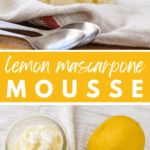
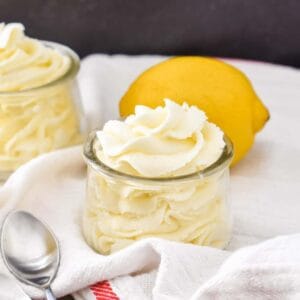
I clicked to triple the recipe for the lemon mousse. The recipe looks amazing and wanted plenty for a crowd. I printed the recipe so I could make up a shopping list in conjunction with many baked goods I would prepare for the week. I read through the instructions for the mousse so I could be sure I was getting the shopping list right. I had forgotten that when I click to electronically multiply the recipe, the new amounts are not reflected in the actual instructions. I did notice that the new amounts to use were in a lighter-typelist at the end of each step of the instructions but not in the context of the instructions. I attempted to work quickly and efficiently, but the checking and rechecking–particularly in ‘divided’ amounts–wasted time. I typically do the multiples by hand and pen in the correct multiple amounts in the printed instructions. I wish the algorithm could auto-correct the instructions. In lieu of that, perhaps go old-school and have one editor make the changes in the instructions so that hundreds of cooks don’t have to repeat the work.
Thanks for the feedback – I don’t control how the recipe card itself works since it’s made by someone else, but I’ve passed that feedback along to the developer though!
Thank you for your creativity.
Since yesterday was freakishly hit in New England, I wanted a cooking dessert. I made this lemon Marscapone Mousse and it was just as delicious as I
remembered. After we ate it all, I remembered I have some blackberries I threw in the freezer. I think I’ll defrost them and make a purée like you mention in your blackberry whipped cream and use that as a topping. I highly recommend this as a last minute summer dessert.
Yay, love to hear this, Gail! And it was ridiculously hot yesterday.
I beat the lemon juice directly with the mascarpone. No curdling.
I used the whole 8 oz container of mascarpone cream beat with the sugar and salt, as directed, but added 3 tablespoons lemon juice directly to the cream. It did NOT curdle. Must easier than folding the juice in at the end. Beat the cream with sugar as directed and folded into the mascarpone mixture. Perfect as a filling for my layer cake.
Can the lemon marscapone mousse be frozen?
Admittedly I’ve never tried it, but my gut tells me it probably wouldn’t thaw well after being frozen.
Is this stable enough to use between cake layers?
It’s not thick and hardening like a buttercream, it’s more like a thick whipped cream texture. But with that said, I’ve used it on cakes before!
You can serve the mousse frozen! It tastes AWESOME!
I had the same issues with multiple recipe amounts not being reflected in the procedural instructions. It is especially confusing when an ingredient is ‘divided’. Very confusing. I work on a MacAir.
Love to hear that it tastes good frozen, gonna have to try that myself next time!
And thanks for the feedback about the instructions – I don’t control how the recipe card itself works since it’s made by someone else, but I’ve passed that feedback along to the developer though!
I made this super quick dessert and it’s so yummy! I loved that it only had a few ingredients and ones I had around. It wasn’t too hard to fold / lightly mix it together to make sure it all combined and turned out so well. I added extra lemon cause I love it, and still mixed together perfectly. Quick. Easy. Fresh tasting! Definitely something I’ll make again to make myself think it’s summer!
I’m so glad you liked it!
When I clicked on 2x the ingredients doubled but they didn’t in the instructions. It still showed the directions for the original amounts. How much sugar should I put in the cheese when doubling?
I’m sorry to hear that function didn’t work for you! If you don’t mind sharing what kind of browser (and if you’re on desktop or mobile) so I can troubleshoot that with the recipe card creator, I’d appreciate the info!
Doubling the recipe would lead to these quantities for each ingredient:
– 12 ounces mascarpone cheese, cold
– 3 tablespoons granulated sugar, divided
– 1 cup heavy cream, cold
– 1 teaspoon pure vanilla extract, can substitute clear vanilla extract
– Pinch of salt
– 2 tablespoon lemon juice, freshly squeezed and cold
I made this yesterday for dessert after a post St Patrick’s Day Corned Beef and Cabbage dinner. Was a great light dessert after a heavy meal.
It was delicious. I split it into a generous 3 portions not 4. Next time I’m going to add more lemon (this time I used 1 TBS) and double the recipe so there is more leftover for me the next day.
Love it! Thanks so much for giving it a try and coming back to share your experience, Gail!